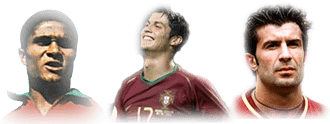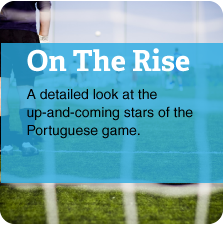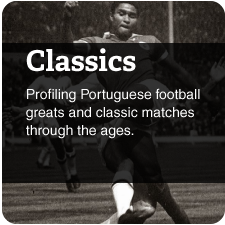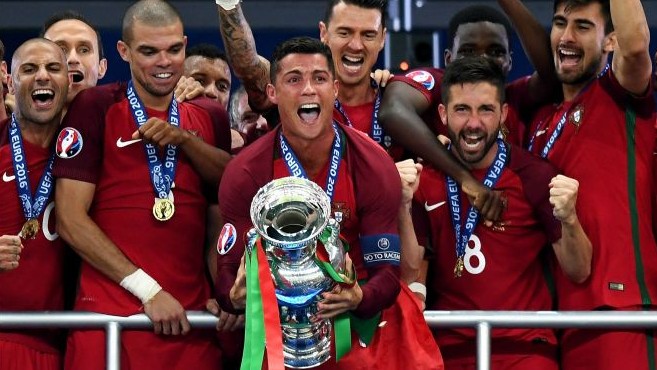 The date: July 10th, 2016. The venue: Saint Denis, France. Can you remember where you were when Portugal won Euro 2016? Take an opportunity to savor the memories of one year ago today when Eder crashed home the goal that secured Portugal's first ever major tournament silverware.
The date: July 10th, 2016. The venue: Saint Denis, France. Can you remember where you were when Portugal won Euro 2016? Take an opportunity to savor the memories of one year ago today when Eder crashed home the goal that secured Portugal's first ever major tournament silverware.
PortuGOAL.net invites you to leave a comment below on where you were and how you reacted to the greatest of Portuguese exploits on a football pitch.
Meanwhile, for Fernando Santos and co. it is back to the drawing board after the penalty kick shootout defeat to Chile in the Confederations Cup. In an analytical piece that dabbles in a little bit of everything from human psychology to football tactics, join lead Seleção correspondent Nathan Motz as he tries to make sense of the historic gap into which Portugal has fallen in 2017: between one glorious chapter and the prospect of even greater renown next summer.
It still does not quite seem real. Today marks the one year anniversary of that blessed occasion when Portugal overcame all obstacles and won the European Championship. I really wish I had been there for the final, but how can I possibly complain? I spent 17 wonderful days traveling across France, recording the journey that Portugal took on its path to a sporting achievement that seemed so unrealistic.
Euro 2016 was chastised by much of the international football community as a tournament of poor quality. Perhaps that is true from the perspective of those loyal to the other nations represented, but to fans of Portugal the tournament brought to life the story of an oft-maligned, discounted, and unfashionable underdog that turned the script on its head in every possible way.
When they said we ought to run away with our group, we narrowly finished third. When they said we could not win games in 90 minutes, we simply won them in 120. When accused of over-reliance on Cristiano Ronaldo we were forced to win entirely without him in the final, and against the host nation no less. And we did all of that playing exactly the type of football that no one would have ever anticipated from Portugal. More on that later.
The passage of time enhances perspective. A year ago, many highly touted journalists and pundits were still trying to figure out exactly who the likes of João Mário and Raphael Guerreiro were. Now it is clearer to me than ever that Portugal’s greatest ever assembly of talent was initiated in France. It is a process that continues to build momentum with the addition of more prodigiously skillful players such as Bernardo Silva.
Can I confess that as beautiful as it was to see Portugal lift that trophy all I could think about was the future and what else this very special team might accomplish? I summoned the courage to write about it in one of my post tournament articles. The dream that nobody wants to say out loud for fear that it might escape. But join me for a moment as I once again articulate that dream. The possibility that the same core of players who were victorious in France might actually achieve something even greater in Russia 12 months from now.
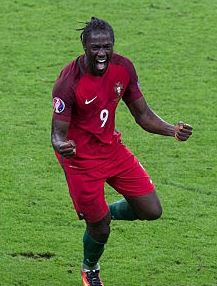
Failure is both life’s most effective and most frequently avoided teacher. It is a mechanism that forces rebirth, remodeling, regrouping, or in some cases revolution. That failure is so feared and despised is almost paradoxical at times given its capacity to eliminate the dynamics that led to its existence in the first place.
I would like to make one thing clear from the onset: this is not an effort to claim or celebrate moral victories. On the contrary, it must be said Portugal was fairly beaten despite fielding its best available squad, injuries to key players notwithstanding. We lost, and now we must give failure permission to become our teacher. As I have alluded to already, Portugal head into next summer’s football showpiece with quite possibly the most realistic chance they have ever had to secure victory. In all likelihood it will be the best chance Portugal have to win a World Cup in my lifetime.
Portugal’s demise at the hands of Chile got me thinking about the science of failure. Yes it is true that in football, as well as in life, there are unpredictable moments that cannot be accounted for that lead to failure. But there are often persistent themes that can be analyzed and understood such that the lessons learned would ideally prevent failures of a similar type in the future. Not so complex, is it? The problem is, both people and football teams alike rarely consider the way in which their own individual strategies contributed to a failure of some sort. They simply blunder on convinced that their methods will eventually yield a previously unattainable success. From the perspective of human psychology, the technical description for the phenomenon of rejecting one's own role in an act of failure is known as “error blindness.”
This model described the Bento era post-Euro 2012. Portugal fans know the sad story all too well. Using the same starting XI and same tactics as he did in Ukraine/Poland, Bento fielded an out-of-shape, out-of-form squad that capitulated in the summer heat of Brazil in 2014. Acknowledging errors committed was simply not in Bento's repertoire. With respect to football managers in the elite echelons of the game, he is hardly alone with these sentiments.
But what if instead we understood the acknowledgement of error as simply the moment that we became smarter than we once were? Because in truth that is exactly what it is. To accept that mistakes were made is the beginning of a process that can result in a much more intelligent and effective outlook on a given situation.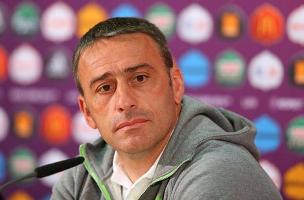
That the single-minded Paulo Bento preceded Fernando Santos makes the reign of the grimacing, cigarette smoking pragmatist appear that much more extraordinary. Beneath our very eyes Santos accomplished something with the Seleção that had not been previously attempted. He grafted them into a tough, unrelenting squad that sapped the will of their opponents. He altered Portugal’s traditional fate of waltzing their way through tournaments only to be denied at the critical moment.
But now Santos himself is at a critical juncture. Will he, like many a footballing manager before him, conveniently sidestep the glaringly obvious lessons learned from failure? Or can he exploit them to their maximum advantage on the world’s biggest stage?
Much has already been said about Portugal’s Confederations Cup campaign. The poor team selection for the first match against Mexico. The tactical missteps throughout. But I have also noticed a tendency amongst Portugal fans to exercise what I will call the “antithetical bias.”
We observe a struggling player or inept tactic and almost instantaneously reach the biased conclusion that only the exact polar opposite can remedy the problem. For example, Nani is old, slow, and cannot score, so the young, fast, and clinical Bruma should be called up instead. Or, Portugal play too defensively, and would do better to reorganize the squad to play attack-minded football with reckless abandon. We are frustrated, and demand for a comprehensive reverse in direction. It is binary thinking. It assumes there are only two options, and since the wrong one was initially chosen the answer must be to select the only other alternative, the polar opposite.
Before anyone mischaracterizes my assertions and suggests that I am unwilling to recognize the obvious, consider this: failure is as equally adept at providing wisdom as it is at spreading delusion. Portugal do not need a radical, polar opposite overhaul in their approach. They simply need an adaptation to what worked so well for them at the Euros last summer. It is quite true that this adaptation will require changes in personnel, but my point is that merely instituting a plug-and-play mentality with certain players is not sufficient. Despite how it may have appeared, Nani and André Gomes were not the only reasons we lost to Chile.
Of all the lessons that Portugal must surely learn from the Confederations Cup, it is that slow football is dead football. It is encouraging that Portugal ratcheted up the tempo as the tournament progressed, but we still need to remember that the natural consequence of compact, defensive tactics can often be sluggish passing and ponderous movement.
But this is where we as fans are again inclined to believe that the solution must be to radically alter our style of play and channel the swashbuckling Portugal of old. My case is that if we did that we would encounter the same negative results as the Portugal of old.
Instead, we need to supercharge the manner in which we remain in control of matches. Compact defence is essential for championship winning sides. There exists bountiful data to prove this. We need to continue prioritizing defensive organization while adding a vigorous injection of speed into our passing cadence. And it must always be purposeful. Mazy runs across the length of the pitch, shooting from distance, and technical flair are easy on the eye, but disguise the reality that this style of play is readily undone by organized defences.
At Euro 2016, I admit to being a bit confused when José Fonte talked to me about Renato Sanches being “an energy player.” At the time I thought he had simply phrased that assessment in a way that does not really make sense in English. Now I know that there really was not a better way to describe Renato’s style of play. Since then, the youngster has lost his way, but for me he embodied the manner of raw energy that would vitalize our playing style without sacrificing its organization. We needed him one year ago, and we will need him just as much one year from now.
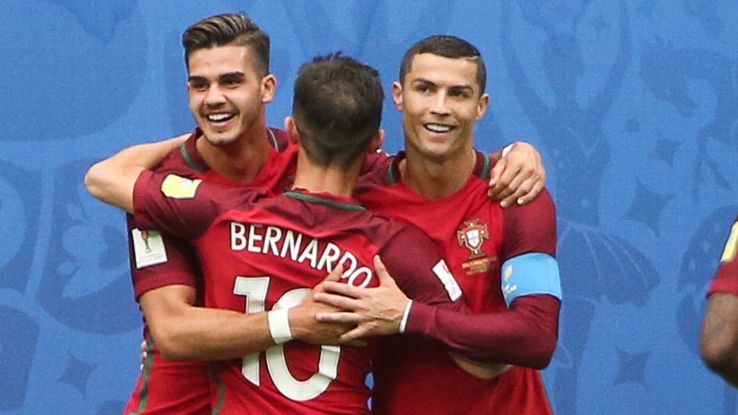 Bernardo Silva’s intelligent pressing has also been proven to be essential, and Joao Mario’s vertical runs into the attacking third were sorely missed this summer. But it is sentimentality that is the greatest threat to this team’s capacity to install a robust, dynamic style of play.
Bernardo Silva’s intelligent pressing has also been proven to be essential, and Joao Mario’s vertical runs into the attacking third were sorely missed this summer. But it is sentimentality that is the greatest threat to this team’s capacity to install a robust, dynamic style of play.
In terms of squad selection, even repeated failures may have difficulty dislodging a particularly fond memory of a certain player. For at least some of the heroes of Euro 2016 it is true that their best playing days are behind them. Will Santos be willing to make hard choices and cut some of these players in order to create an even more formidable squad?
We need players who adhere to a disciplined set of rules for their respective positions, but are capable of applying a real turn of pace when the situation requires. Even though the knee-jerk removal of certain players like André Gomes will not fix all of our problems it remains the case that this next club season needs to be viewed by each potential member of this squad as a pass-or-fail trial period. No points awarded for seniority. Prior achievement must no longer act as a substitute for present form. The conclusive evidence for this folly is already on the table.
In the coming year there are many unknowns. Will our best players be able to maintain or in some cases recover the quality of club form that propelled them into Euro 2016? Will André Silva and Bernardo wilt under the bright lights and high drama of Milan and Manchester respectively? Will Cristiano Ronaldo, at the age of 33, be ready and able to spearhead the Portuguese armada as they embark on one final quest under his leadership to conquer the world?
To our pragmatism we must add speed of thought and violence of action, and just that group of players willing and able to embody those core tenets on the pitch. Come next July, may it be that the euphoric delirium of last summer’s victory be repeated because we were enlightened by the bitter taste of this summer’s defeat.
Força Seleção.
by Nathan Motz

